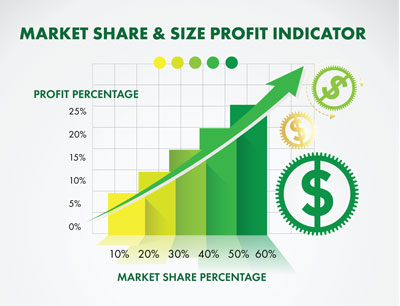Calculate your market share and generate more money in your business.
With the New Year upon us, it’s critical now more than ever to use your most powerful indicators of success to generate more money in your business and become more productive.
Start with calculating one measurement, and you will find, when done properly, you’ll be well on your path to planning growth.
The market share of your business is simply its dollar sales in a given time period, expressed as a percentage of the total market sales volume.
To calculate your market share, take your company’s sales revenue in a specific period and divide it by the total sales revenue of all HVACR residential service companies in your service area over the same period.
If the total market sales revenue is unknown, you can estimate the total market revenue by multiplying $660 by the number of residential homes in your service area.
For example, if your service community consists of 70,000 homes, multiply by $660 per home and the total market revenue is approximately $46,200,000.
If your company generated $2,000,000 in revenue in 2017 in this service area, your market share is approximately 4.3 percent.
It’s amazing how many companies ignore market share and measure success by comparing their revenue to their competitors’ revenue.
Or worse, they do it by comparing the number of trucks they have, compared to the number of trucks of their competitors.
In reality, a much more meaningful method of measuring success is comparing what percentage of market share has been captured of the markets’ total revenue.
Avoid these mistakes at all costs if you truly want to examine your business and increase profitability.
 Measure by Market Share
Measure by Market Share
While market share certainly does not guarantee success, it is an indicator of success. Here are some very powerful reasons to focus on market share.
Profit: It is widely recognized that one of the main determinants of business profitability is market share. Under most circumstances, companies that have achieved a high market share are considerably more profitable than their smaller-share rivals.
Market Power: Greater size permits a company to gain bargaining power in dealing with suppliers. As market share grows, economies of scale are achieved to a much greater degree resulting in cost savings in purchasing. Companies with small market share pay significantly higher prices on purchases.
Marketing Cost Decreases: As market share increases, there is some tendency for marketing costs, as a percentage of sales, to decline. This reflects true scale economies, including the spreading of fixed marketing costs and the ability of large-share businesses to utilize more efficient media and marketing methods.
Visibility Brings Comfort: Companies with larger market share benefit from the “bandwagon effect” from greater visibility. Larger brings a peace of comfort. Consumers feel more comfortable buying from companies with larger market share when acquiring an infrequently purchased product such as a new system. Since there is a bigger risk inherent in a wrong choice, the purchaser is often willing to pay a premium for assured quality.
In summary, market share is one of the most important factors you should measure to determine your success. Determine your total market sales revenue, identify the percentage you have captured, set your target market share percentage you wish to achieve, and develop a plan to achieve it.
And that’s how you become a money-making machine.


 Measure by Market Share
Measure by Market Share


